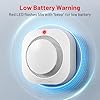If you’ve ever noticed a smoke detector light blinking and wondered what it meant, you’re not alone. Many people think that the blinking light is just a battery indicator, but it can actually be an indication of a much more serious problem.
Contents
How to tell if your smoke detector needs batteries?
If your smoke detector is chirping, beeping, or otherwise making noise, it probably needs new batteries. Most smoke detectors will make a noise when the batteries are running low, to alert you that it’s time to replace them. You should check the batteries in your smoke detector every month, and replace them if necessary.
Why do smoke detector lights blink?
The blinking light on a smoke detector is an indication that the battery needs to be replaced. Most smoke detectors have a built-in battery that lasts for about a year. When the battery starts to die, the smoke detector will chirp to let you know that it needs to be replaced. The blinking light is just another way to let you know that the battery needs to be replaced.
How often should you test your smoke detectors?
Most people don’t think about their smoke detectors until they go off unexpectedly in the middle of the night. But smoke detectors play a vital role in keeping your family safe from fire, so it’s important to make sure they are in good working order. The National Fire Protection Association recommends that you test your smoke detectors monthly and replace the batteries at least once a year.
Smoke detectors work by detecting the particles in smoke, which sets off an alarm. The alarm is designed to wake you up so you can escape from the fire. Smoke detectors can’t prevent a fire from happening, but they can give you the early warning you need to get out safely.
If your smoke detector is more than 10 years old, it’s time to replace it. Even if it seems to be working fine, the sensors in older detectors can degrade over time and become less sensitive. So it’s best to err on the side of caution and get a new one.
When you’re testing your smoke detector, be sure to follow the manufacturer’s instructions. Some detectors have a test button that simulates smoke, while others need to be removed from the wall or ceiling and held close to a smoke source. If the alarm sounds, that means the detector is working properly.
If you have any questions about smoke detectors or how often to test them, please contact your local fire department.
What to do if your smoke detector goes off?
If your smoke detector goes off, you should immediately evacuate the building. If you cannot evacuate, go to a room with a window and wave a towel or piece of clothing to signal for help. If you are trapped, seal the cracks around doors and cover vents with wet towels or sheets to keep smoke from coming in. Call 911 and wait for help.
How to properly maintain your smoke detectors?
Your smoke detector is an important part of your home’s fire safety system. Here are some tips on how to properly maintain your smoke detector to ensure it is working properly.
- Test your smoke detector monthly. Most smoke detectors have a test button that you can press to ensure the alarm is working.
- Vacuum your smoke detector regularly to remove any dust or debris that could interfere with its operation.
- Replace the batteries in your smoke detector every year.
- If your smoke detector is more than 10 years old, consider replacing it with a new one.
- Make sure your smoke detector is located in a central location in your home so that it can be heard throughout the house.
What types of smoke detectors are available?
There are four main types of smoke detectors available on the market today: ionization, photoelectric, dual, and laser. Ionization smoke detectors work by using a small amount of radioactive material to ionize the air and create an electrical current. This current is then used to trigger an alarm when it reaches a certain level. Photoelectric smoke detectors work by using a light sensor to detect smoke in the air. Dual smoke detectors combine both ionization and photoelectric technology to provide the most comprehensive protection. Laser smoke detectors work by using a laser beam to detect smoke in the air.
Why are smoke detectors important?
Smoke detectors provide an early warning signal in the event of a fire, giving people the opportunity to evacuate the premises and avoid injury or death. Smoke detectors are therefore an essential safety device in both commercial and residential properties.
Smoke detectors work by sensing smoke particles in the air and sounding an alarm to alert people to the presence of fire. The types of smoke detectors most commonly used are ionization smoke detectors and photoelectric smoke detectors.
Ionization smoke detectors work by using a small amount of radioactive material to ionize the air in the sensing chamber. This ionized air conducts electricity between two metal plates, and when smoke particles enter the chamber, they disrupt the flow of electricity, triggering the alarm.
Photoelectric smoke detectors work by shining a light beam from a light-emitting diode (LED) onto a photosensitive sensor. When smoke particles enter the sensing chamber, they scatter the light beam, which is detected by the sensor and triggers the alarm.
Both types of smoke detector are effective at detecting smoke from fires, but photoelectric smoke detectors are generally more sensitive to slow-smoldering fires, while ionization smoke detectors are more sensitive to fast-burning fires.
Smoke detectors should be installed in every room of the home, as well as in hallways and common areas. They should be placed on the ceiling or high on a wall, and at least 10 feet (3 meters) away from any potential sources of false alarms, such as cooking appliances, bathroom showers, and outside doors.
Smoke detectors should be tested regularly to ensure that they are working properly, and the batteries should be replaced at least once a year.
Summary
If you’ve ever noticed a blinking light on your smoke detector, you may have wondered if it’s supposed to be doing that. The answer is yes! A blinking light on a smoke detector indicates that the battery is working and that the detector is receiving power. So if you see a blinking light on your smoke detector, there’s no need to worry.



















